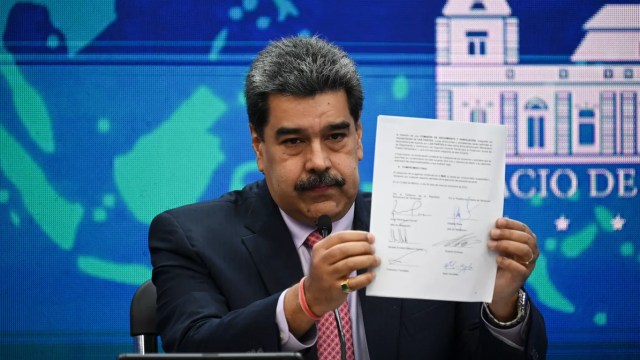
The government and opposition of crisis-battered Venezuela have agreed to set up a UN-backed humanitarian fund, but much will depend on how they follow up or reach additional agreements.
By Axios – Marina E. Franco
Dic 01. 2022
Why it matters: The lives of millions of Venezuelans remain at stake as they face deep poverty and food insecurity amid the political turmoil.
Catch up quick: The U.S. and other governments have recognized opposition leader Juan Guaidó as Venezuela’s legitimate president since 2019, meaning he has control of international bank accounts.
- But Nicolás Maduro has kept governing.
- Political instability combined with years of budget mismanagement, economic sanctions from Western powers and sky-high inflation have deepened hunger and poverty crises in Venezuela, prompting mass migration, including to the U.S.
Driving the news: Representatives of the Maduro government and the opposition, a coalition known as the Unitary Platform, agreed during renewed negotiations in México City last weekend to set up a UN-backed fund with nearly $3 billion of Venezuela’s frozen international assets for humanitarian aid.
- That same day, the U.S., though not a direct participant in the talks, partly eased its oil sanctions on Maduro’s government.
- A White House official who agreed to speak on condition of anonymity tells Axios the U.S. has made clear to the regime that more sanctions relief will happen only if Maduro’s team remains in the negotiations and they reach concrete outcomes.
Yes, but: The agreement only scratches the surface of the items on the Venezuelan agenda, and there isn’t yet evidence that the Maduro side will yield on other substantial matters.
- The sides still need to discuss thorny issues like the 2024 presidential election (Maduro has said he’s running).
- There isn’t even a set date for the next round of negotiations between the parties in México.
What they’re saying: “There have been many negotiations before, but they usually fall apart with nothing to show for them or with spoken promises that end up unfulfilled,” says Phil Gunson, Caracas-based senior analyst at the International Crisis Group.
- Carrying out the agreement will be another matter entirely, Gunson says, as the assets have to be unfrozen (a lengthy process), the UN must figure out how to set up the fund and decisions on how exactly to spend the money must be made.
Between the lines: Both sides had reasons to seek an agreement this time as political winds have shifted in Maduro’s favor, Gunson says.
- World governments are “growing tired of neither being able to deal with a ‘legitimate government’ that doesn’t actually govern nor having full relations with the guy actually in the presidential palace,” Gunson says.
- Newly-elected leftist leaders in Latin América like Colombian President Gustavo Petro, who recently reopened his nation’s border with Venezuela, have taken a more pragmatic approach than their predecessors.
- Portugal and France have also met with Maduro or reinstated ambassadors to his government.
- Guaidó is losing support within the Unitary Platform, according to news reports.
What we’re watching: The White House official said the tit-for-tat of sanctions relief for concessions from the regime was a “work in progress” and that, while the Biden administration shares the opposition’s goal of free and fair elections in 2024, restoring democracy “may be a longer undertaking.”
- In the meantime, the U.S. also wants to focus on improving the humanitarian situation and building consensus with countries in the region, the official said.
- “Our role is a simple one. If they produce concrete outcomes, we will respond. If there are regressions, we will re-impose pressure,” the official said.
…
Read More: Axios – Uncertainty persists as Venezuela talks continue
…

